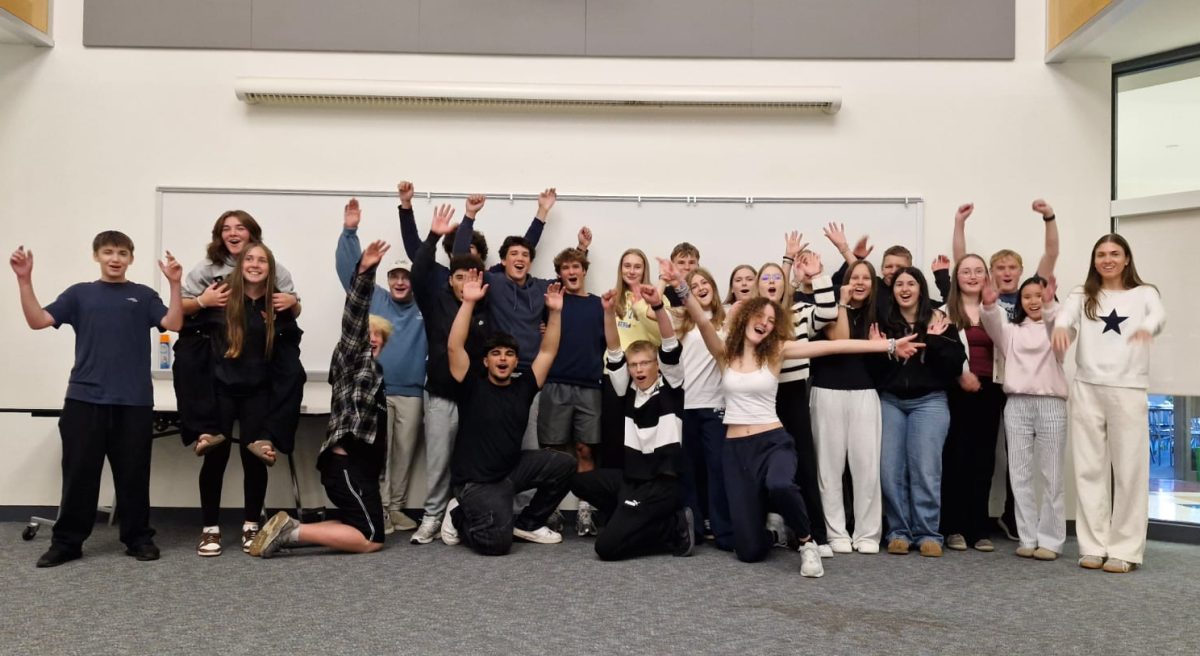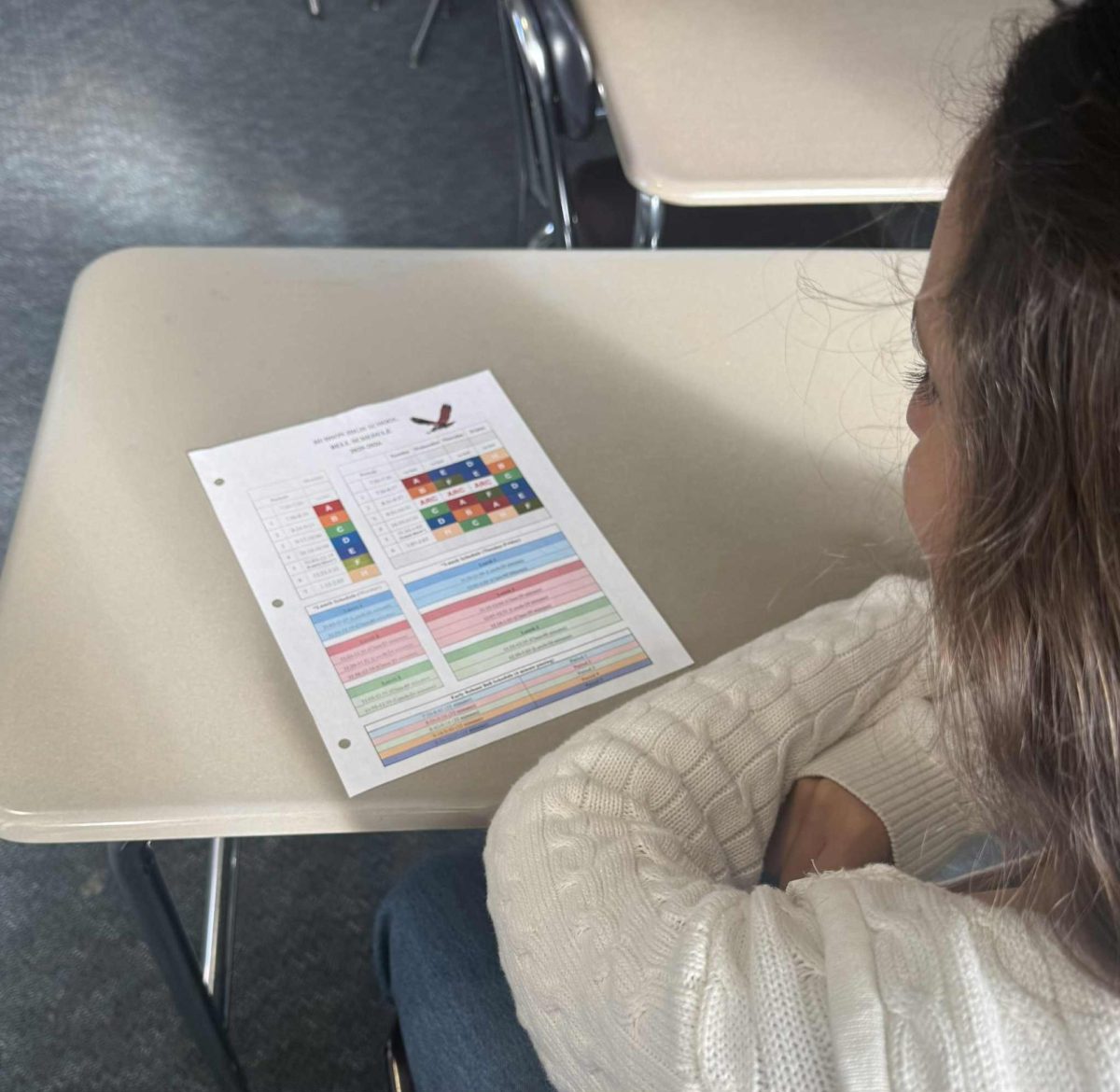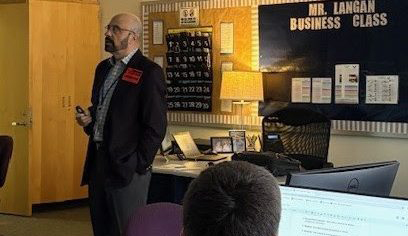
by Alison Eadie, Alex Schley, Emily Metivier
Last spring the Hudson School Committee decided to enforce a clause in the teachers contract known as 5C. This has been part of the teacher’s contract since 1973, but it has never been strictly enforced. In previous years, teachers were required to stay after school on the first Monday of every month and attend various other meetings throughout the month as needed; the rest of their after-school time they dedicated to providing after-school help for students. This year teachers must attend a meeting every Monday. One other day of the week they must attend team meetings, and then on one of the remaining days teachers offer after-school help.
“I go to Mr. Caron’s room, and I like to play the piano, but so far this year I’ve only been able to play the piano twice in three weeks, when last year I could play almost every day. But now his meetings affect when people can go [in his classroom] and practice music,” junior Cole Magruder said. He feels that he never has time to practice the piano anymore. Magruder says 5C affects students in the arts as well as athletes at Hudson High School.
Magruder feels that he might struggle this year to finish his homework at a reasonable time, especially during lacrosse season. “During lacrosse season I used to stay after with teachers, so I could get stuff done because my lacrosse games used to go late,” Magruder said. It might be harder for students to play sports and get extra help due to the confusing schedules the teachers have after school.
Brothers Matt and Jack Snow, both members of Community Council, participate with other Community Council members in the 5C committee to help students deal with the changes brought on by 5C.
Many students feel sad and upset that they cannot participate in clubs that they were in last year.
Jack Snow says that the 5C committee is going to try to solve some problems to help students get the extra help they need after school and to try to make sure clubs like the Scribbler, Glee Club, National Honor Society, and the Gay Straight Alliance can happen.
That hour after school when students wait for clubs and athletics to begin can be a problem. “With all the teachers in meetings, there’s nobody supervising them really, and they’re kind of out wandering a little bit more, and I guess my concern is when students have nothing to do and no place to be, the potential for them making bad decisions could increase,” math teacher and coach Joe Lentino said. Many other students have to take the late bus home at 3:15, only allowing for an impractical 10 or so minutes of help before they need to go.
Last year at a school committee meeting, parents and students alike expressed concern over how 5C would affect after-school clubs. Some clubs have been able to adjust, but some are really struggling to schedule around 5C. The drama program has changed rehearsals for Godspell from two days a week to three because of the hour of rehearsal time lost while director Kathleen McKenzie is fulfilling her 5C obligation. From 2-3, the cast learns music with outside Musical Director Stan Hansen.
While the drama society has adjusted to 5C, other clubs and activities are finding it hard to maintain club attendance, since many activities are now scheduled on overlapping days. Jeanette McLellan runs the Glee Club, and since jazz band runs on the same day, students now have to choose between these activities, whereas last year they could be involved in both. Because of this, unless Glee Club can find a different day to meet, it may not run this year.
Gay Straight Alliance has stopped meeting every week, now favoring one or two meetings a month, so students are not forced to choose between after-school help and this club.
National Honor Society is still looking for an advisor. Guidance counselor Megan Dubay was the former advisor, and she is still sending emails to the students offering community service opportunities, but because of 5C she may not be able to advise the group. Guidance counselors have 5C time as well because they are under the same contract as the teachers. Dubay is trying to plan her busy day after school, including picking up her children from daycare. “It used to be more flexible,” said Dubay, and now teachers “have to find a way to make it work.”
Another great program that may not be able to run this year is a peer tutoring program that has previously been run by special education teacher Jessica Byrd. The program gives students with special needs a chance to interact with regular education students after school in a way that is not possible during the school day.
Students really enjoyed walking the track, doing arts and crafts, and playing basketball with their tutors whom they really look up to. The program is “a good experience for the peer tutors that would maybe like to go into the field of special education. It gave them an opportunity to learn about disabilities, how to handle certain behaviors and situations,” said Byrd.
This program would have to run right after school, since the students cannot be unsupervised for an hour until 3:03 when the group could theoretically start. Special education students take a bus home after school, and they would definitely not be able to return at 3:03. So instead of hanging out and having fun after school, they just go home.
Athletics is a huge part of what goes on after school at Hudson High; many teachers are involved as coaches for various sports teams. Fortunately, many sports have off campus coaches who can start practices, but coaches like Lentino “like to be a part of everything. Not being able to be out there before practice and do my part to make sure the kids know what they’re supposed to do is tough. Sometimes I’m running out and they’re already in the middle of a drill,” he says.
“Personally, I always feel like I’m neglecting them a little bit, because they’re not getting my full effort.” Girls field hockey coach Jen Wallingford finds that 5C is all “about being very tightly scheduled. Three days a week I’m in meetings. One day a week is for the kids, and the other two I am hustling out to get the bus [to away games.] It really doesn’t leave a lot of room for getting teacher things done that are on a practical list of things to do…correcting papers, making detailed class plans.”
Perhaps the biggest concern around 5C is after-school help. Will students be able to get the help they need if teachers are only after school one day a week? English teacher and sophomore class advisor Susan Menanson says, “Meetings impede students getting extra help when they need it.” Most teachers offer their extra help day on Tuesdays or Thursdays for one hour.
“I feel like the anxiety level of most of the students has increased,” Lentino says. “They’re looking to try to do the right thing and get extra help, and we’re not available for that right now. A lot of people have had a really hard time because they’re trying to hit all their teachers in this short amount of time.”
“Most people don’t realize teachers use a lot of time for students,” Menanson says. Teachers are in early, sometimes use their lunchtime to help students, and they would still leave late anyway. “It’s wrong to say: we’re going to make you stay because you don’t stay” because most teachers did stay after school before 5C anyway. Menanson says teachers are “not trusted to do the right thing, and we should be, because our hearts are in the right place.”
According to teachers’ union leader Michael Nanartowich, “At this point in time there is no communication about 5C between the association and the school committee.”
Since it is only the beginning of the school year, the impact 5C will have on student life, their academics and their extracurricular activities, is yet to be seen.






